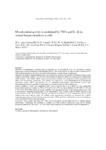Mostrar o rexistro simple do ítem
Mitochondrial activity is modulated by TNFα and IL-1β in normal human chondrocyte cells
| dc.contributor.author | López-Armada, María José | |
| dc.contributor.author | Caramés, Beatriz | |
| dc.contributor.author | Martín, M.A. | |
| dc.contributor.author | Cillero-Pastor, B. | |
| dc.contributor.author | Lires-Dean, M. | |
| dc.contributor.author | Fuentes Boquete, Isaac Manuel | |
| dc.contributor.author | Arenas, J. | |
| dc.contributor.author | Blanco García, Francisco J | |
| dc.date.accessioned | 2018-09-05T12:10:28Z | |
| dc.date.available | 2018-09-05T12:10:28Z | |
| dc.date.issued | 2006-05-05 | |
| dc.identifier.citation | López-Armada MJ, Caramés B, Martín MA, Cillero-Pastor B, Lires-Dean BS, Fuentes-Boquete I, et al. Mitochondrial activity is modulated by TNFα and IL-1β in normal human chondrocyte cells. Osteoartr Cart. 2006;14(10):1011-1022 | es_ES |
| dc.identifier.issn | 1063-4584 | |
| dc.identifier.uri | http://hdl.handle.net/2183/20992 | |
| dc.description.abstract | [Abstract] Objective. Pro-inflammatory cytokines play an important role in osteoarthritis (OA). In osteoarthritic cartilage, chondrocytes exhibit an alteration in mitochondrial activity. This study analyzes the effect of tumor necrosis factor-α (TNFα) and interleukin-1β (IL-1β) on the mitochondrial activity of normal human chondrocytes. Materials and methods. Mitochondrial function was evaluated by analyzing the activities of respiratory chain enzyme complexes and citrate synthase, as well as by mitochondrial membrane potential (Δψm) and adenosine triphosphate (ATP) synthesis. Bcl-2 family mRNA expression and protein synthesis were analyzed by RNase protection assay (RPA) and Western-blot, respectively. Cell viability was analyzed by 3-[4,5-dimethylthiazol-2-yl]-2,5-diphenyl tetrazolium bromide (MTT) and apoptosis by 4′, 6-diamidino-2-phenylindole dihydrochloride (DAPI) stain. Glycosaminoglycans were quantified in supernatant by a dimethyl-methylene blue binding assay. Results. Compared to basal cells, stimulation with TNFα (10 ng/ml) and IL-1β (5 ng/ml) for 48 h significantly decreased the activity of complex I (TNFα = 35% and IL-1β = 35%) and the production of ATP (TNFα = 18% and IL-1β = 19%). Both TNFα and IL-1β caused a definitive time-dependent decrease in the red/green fluorescence ratio in chondrocytes, indicating depolarization of the mitochondria. Both cytokines induced mRNA expression and protein synthesis of the Bcl-2 family. Rotenone, an inhibitor of complex I, caused a significant reduction of the red/green ratio, but it did not reduce the viability of the chondrocytes. Rotenone also increased Bcl-2 mRNA expression and protein synthesis. Finally, rotenone as well as TNFα and IL-1β, reduced the content of proteoglycans in the extracellular matrix of normal cartilage. Conclusion. These results show that both TNFα and IL-1β regulate mitochondrial function in human articular chondrocytes. Furthermore, the inhibition of complex I by both cytokines could play a key role in cartilage degradation induced by TNFα and IL-1β. These data could be important for understanding of the OA pathogenesis. | es_ES |
| dc.description.sponsorship | Instituto de Salud Carlos III; 01/1426 | es_ES |
| dc.description.sponsorship | Instituto de Salud Carlos III; 02/1700 | es_ES |
| dc.language.iso | eng | es_ES |
| dc.publisher | Elsevier | es_ES |
| dc.relation.uri | https://doi.org/10.1016/j.joca.2006.03.008 | es_ES |
| dc.rights | Atribución-NoComercial-SinDerivadas 3.0 España | es_ES |
| dc.rights.uri | http://creativecommons.org/licenses/by-nc-nd/3.0/es/ | * |
| dc.subject | Cytokines | es_ES |
| dc.subject | Apoptosis | es_ES |
| dc.subject | Mitochondria | es_ES |
| dc.subject | Chondrocytes | es_ES |
| dc.subject | Osteoarthritis | es_ES |
| dc.title | Mitochondrial activity is modulated by TNFα and IL-1β in normal human chondrocyte cells | es_ES |
| dc.type | info:eu-repo/semantics/article | es_ES |
| dc.rights.access | info:eu-repo/semantics/openAccess | es_ES |
| UDC.journalTitle | Osteoarthritis and cartilage | es_ES |
| UDC.volume | 14 | es_ES |
| UDC.issue | 10 | es_ES |
| UDC.startPage | 1011 | es_ES |
| UDC.endPage | 1022 | es_ES |
Ficheiros no ítem
Este ítem aparece na(s) seguinte(s) colección(s)
-
GI-TCMR - Artigos [129]
-
INIBIC- REUMA - Artigos [184]






